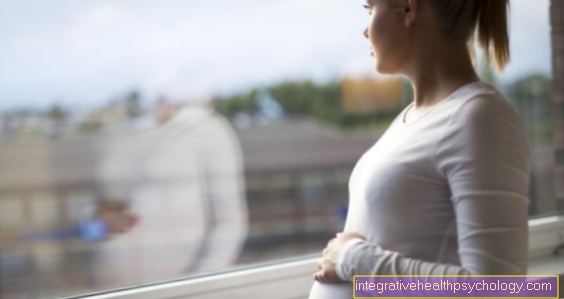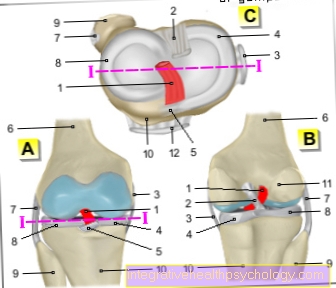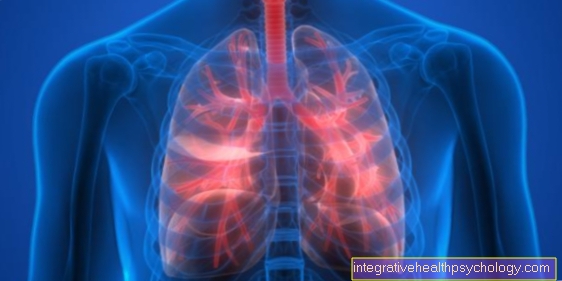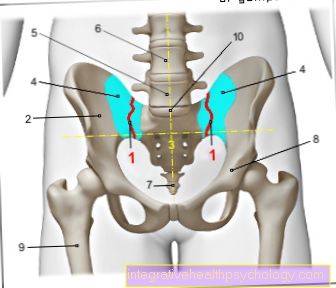Colon cancer
introduction
Colon cancer is one of the most common cancers in Germany. Medically, colon cancer is also called Colon cancer designated. It usually develops from benign preliminary stages that eventually degenerate over a few years. In the early stages, the disease is often completely symptom-free, which is why a preventive colonoscopy is an extremely important tool for identifying and removing changes in the bowel at an early stage.

causes
The exact causes for the development of colon cancer are not clear. However, extensive studies in recent years have identified many risk factors that may increase the risk of colon cancer. These include a lack of exercise, the consumption of a lot of sugar, the daily consumption of red meat and sausage products (especially pork and beef) as well as low-fiber foods. Fiber is important to promote the movement of the bowel. If the diet is very low in fiber, the motor skills of the intestine are reduced, so that digestive products that have a damaging effect on the intestinal walls remain in the digestive tract for longer. This favors the development of tissue growth.
Read more on the subject at: What are the causes of colon cancer? and Lynch Syndrome
There is also an accumulation of colon cancer cases in some families. This indicates a genetic predisposition which can lead to the development of colon cancer. Members of affected families therefore receive extensive benefits early on in life Pension offersto detect canker sores at an early stage or to remove their precursors. However, such a hereditary predisposition only exists in 5% of patients with colon cancer. 95% of colon cancer ulcers arise without such a family background. Patients with pre-existing intestinal diseases, for example Crohn's disease (an autoimmune disease that targets intestinal cells) or Ulcerative colitis, however, also have an increased risk of colon cancer compared to the general population.
In most cases, the malignant ulcers develop from benign precursors. This development is also called Adenoma-carcinoma sequence designated. The benign growths do not always necessarily have to degenerate. The adenomas can be divided into different types, each of which has a different risk of degeneration. If adenomas are discovered during a preventive colonoscopy, however, they are always removed prophylactically so that there is no risk of degeneration in the first place.
Symptoms / signs
In the early stages, colon cancer is completely asymptomatic in most cases. One sign is blood in the stool, which is usually not visible to the naked eye. A test for this so-called occult blood in the stool can therefore be carried out at the family doctor as a preventive measure for colon cancer. Mucus in the stool can also occur in colon cancer. If the tumor sits more towards the rectum, the stools are often very narrow, which are also known as pencil or goat droppings. Changes in bowel habits can be associated with this, for example alternating diarrhea and constipation as well as flatulence. These can cause more or less severe abdominal pain. Colon cancer can also lead to the general symptoms that any malignant disease can cause. These include unwanted weight loss, fever, night sweats, general fatigue and a drop in performance.
Read more on the subject below: Colon Cancer Symptoms
At what age does colon cancer occur?
Colon cancer is primarily a disease that im older age occurs. The average is the patients about 65 years old when the initial diagnosis is made.
9 out of 10 cases of colon cancer are diagnosed by age> 50. The older you get, the more likely you are to develop colon cancer. Genetic syndromes such as Lynch syndrome or familial adenomatous polyposis coli are rarely the cause. Then people at a younger age are affected.
Diagnosis
Diagnosing a patient with suspected colon cancer always includes a medical consultation and physical examination. The doctor will ask the patient about his symptoms and especially feel his abdomen and lymph nodes for abnormalities. This also includes a digital rectal examination (DRU), in which the patient's rectum is palpated with a finger. Tumors located there can then often be felt. During a colonoscopy (Colonoscopy) can be benign and malicious changes in the Intestinal lining detect. If a likely malignant lesion is actually found, a sample can be taken, which can then be examined in the pathology department.
If it is actually colon cancer, further examination methods follow, which should record the current status of the disease. This is the basis on which the patient can be treated. This includes an ultrasound of the liver to look for possible colon cancer colonization. The lungs are also checked for such metastases, usually using an X-ray. Imaging of the body by means of computer and / or magnetic resonance tomography shows whether metastases have settled elsewhere in the body and how far the tumor has grown into the intestinal walls and surrounding tissue. Also Lymph node metastases can often be well delimited.
therapy
Colon cancer usually will operational treated. The affected section of the intestine is completely removed and the two free ends are sewn together. The exact extent of the operation and additional measures such as chemotherapy and / or Irradiation, are determined individually depending on the severity of the patient's disease. Some patients also receive chemotherapy before the operation, which is supposed to make the tumor smaller and therefore easier to operate. In addition to the affected section of the intestine, the lymph nodes in the lymphatic drainage area of the tumor are usually also removed, as tumor cells may have already settled there. The plant of a artificial anus can often be circumvented these days thanks to modern surgical procedures. That is also important Aftercare following the operation. The patient receives colonoscopies, and imaging tests at regular intervals Blood countsto detect a recurrence of the disease early. The level of certain tumor markers can be monitored in the blood (CEA). An increase in these markers in the further course after an operation could indicate a recurrence of the colon cancer.
chemotherapy
Alongside surgery, chemotherapy is one of the major pillars in the treatment of colon cancer. The principle of chemotherapy is to destroy the tumor cells and prevent them from growing with the help of aggressive substances, especially those that attack the tumor. In this way, tumors can be made smaller and the growth of new tumors prevented.
The use of chemotherapy for colon cancer depends on the exact diagnosis and condition of the patient. There are different types of chemotherapy. The neoadjuvant chemotherapy means a therapy before the operative therapy in order to reduce the tumor. It can be operated on better.
Adjuvant chemotherapy means that chemotherapy drugs are given after the operation. This happens in advanced tumors with lymph node involvement or other high-risk tumors. In some cases, chemotherapy is also useful for distant metastases.
It is important to understand that any use of chemotherapy for colon cancer must be a carefully considered decision. In addition to the respective stage, the patient's condition is decisive. It is an aggressive therapy that takes place in several cycles over a relatively long period of weeks or months. It is very rich in side effects. Nausea, vomiting, hair loss, inflammation of the mucous membranes and changes in the blood count can occur. In some cases, the quality of life is severely restricted. However, chemotherapy can significantly increase patient survival. Therefore, surgeons, internists and, if necessary, other specialties should jointly decide on the use of chemotherapy.
Read more about this under: Chemotherapy for colon cancer, side effects of chemotherapy
Prognosis / chances of recovery / healing
The prognosis of a patient with colon cancer depends very much on the stage of the disease. in the Early stage are the Chances of recovery very good, as the tumor is still small and has not yet grown into the surrounding tissue. Also he has not yet in Lymph nodes or other organs scattered. The affected section of the intestine can then simply be removed therapeutically.
However, if the colon cancer has already grown significantly and has spread to other organs, the therapy is more difficult. The more organs and lymph node stations are affected and the larger the tumor, the worse the patient's prognosis. The general condition of the patient also plays a major role. Older people and people with multiple illnesses have lower chances of recovery than young and previously healthy patients. Looking at all colon cancer patients, it turns out that roughly 40-60% are still alive five years after their diagnosis. Early detection offers are therefore extremely important because the earlier the disease is discovered and treated, the better the chances of recovery.
Read more on this topic at: Colon cancer prognosis
Metastases
Colon cancer can grow into blood vessels and lymphatics from a certain size. In this way, tumor cells can settle and Metastases form in other organs. The settlement via blood vessels is medically called hematogenous metastasis referred to as the one via lymphatic vessels lymphogenic metastasis. In colon cancer, the lungs and liver in particular are often affected by metastases. This is due to the course of the blood vessels and lymph vessels, which form metastatic routes for the tumor cells from the intestine.
Terminal stage
Colon cancer is divided into four different stages. Stage IV is the most advanced stage in which the tumor has already metastasized in distant organs, for example in the liver and / or lungs. These patients have a rather poor prognosis. The focus in the therapy of these patients is on maintaining their quality of life. Using chemotherapy can keep primary tumors and metastases in check for a while and extend survival time. On average, only 5% of colorectal cancer patients with stage IV are still alive after five years.
Read more on this topic at: End-stage colon cancer
How curable is colon cancer?
For patients or relatives, the first question that arises after colon cancer is diagnosed is: How curable is colon cancer? There is no general answer to this and it is extremely dependent on the stage of the tumor at the time of diagnosis. In particular, the question of how deep the colon cancer has grown into the intestinal wall and whether lymph nodes or other organs are affected is essential.
In principle, it can be said that colon cancer is definitely curable in its early stages. This is the case when only the lining of the colon is affected. The muscle layer, as well as the lymph nodes and other organs, must be tumor-free. Then the removal of the colon cancer affected section is a curative measure. Nevertheless, checks must still be carried out to detect a recurrence of colon cancer.
Unfortunately, colon cancer only becomes apparent in the late stages due to symptoms. Therefore, when the diagnosis is made, it is usually in an advanced stage, so that it is often no longer completely curable here. Nevertheless, in many cases, even if therapy is not aimed at healing, a good life expectancy and quality is possible for the patient.
Read more on the subject at: Is Colon Cancer Curable?
What are the chances of survival?
This question also has to be answered by the fact that the chances of survival in colon cancer vary. You depend on the Extent of the disease and from Condition of the patient.
Many studies have looked at the chances of survival in colon cancer. Always the 5 year survival rate specified. It corresponds to the proportion of patients who are still alive 5 years after the diagnosis. Depending on the tumor stage, the following results are obtained: Stage I 80-100%, Stage II 60-80%, Stage III 30-60%, Stage IV 0-57%. You can see that the chances of survival decrease sharply the further the colon cancer has progressed. This is also where the importance of Screening exams clear.
However, the numbers are based on statistical evaluations. An individual assessment of the chances of survival must always be made for each patient himself. A fit patient without underlying diseases has a higher chance of survival than a weak, seriously ill patient with the same tumor stage. Therefore, when answering the question "What are the chances of survival?", One should always rely on the assessment of the treating physician. The above numbers can give a rough guide.
prophylaxis

There are some prophylactic measures that can significantly reduce the risk of developing colon cancer. A healthy and balanced diet with enough fiber, little red meat (pork, beef), sufficient fluid intake and little alcohol is very important. Exercise is also hugely important in reducing the risk of colon cancer. Exercise ensures a good metabolism and stimulates the Digestive processes on. There are also various screening methods that are used for the early detection of colon cancer. From the 55 years of age take over the statutory health insurance every 10 years a preventive colonoscopy, as colon cancer almost always develops from benign precursors (adenomas). If a benign finding is cut out during such a colonoscopy, the patient's re-presentation time for a new preventive colonoscopy is shortened to 3-5 years. Otherwise, a colonoscopy every 10 years is sufficient. Patients who have a family history of colon cancer will receive colonoscopies from 35 years of age at the expense of the health insurance company.
Another early detection method is the stool test for hidden things blood. From the age of 50 this can be carried out annually by the family doctor. Regular preventive care is also part of the family doctor's care Scan of the rectum with the finger (digital rectal examination), as many canker sores are located in this area and can often be felt. With regular colon cancer screening, most cases can be discovered very early and successfully treated. Therefore you should definitely take advantage of the offer.
nutrition
A healthy diet has protective properties with regard to the risk of colon cancer. High fiber diet stimulates the Intestinal motor skills on. As a result, the waste products of the metabolism are transported away from the intestine more quickly and can have less damaging influence on the intestinal mucosa. Regular consumption of red meat - especially pork and beef - appears to increase the risk of colon cancer. The same applies to increased Alcohol and nicotine consumption. Very high sugar Diet as well as the one widely used nowadays Sedentary lifestyle are also apparently associated with an increased incidence of colon cancer. A healthy and balanced diet with sufficient exercise can accordingly reduce the risk of colon cancer and should definitely be taken seriously.




.jpg)






.jpg)

















